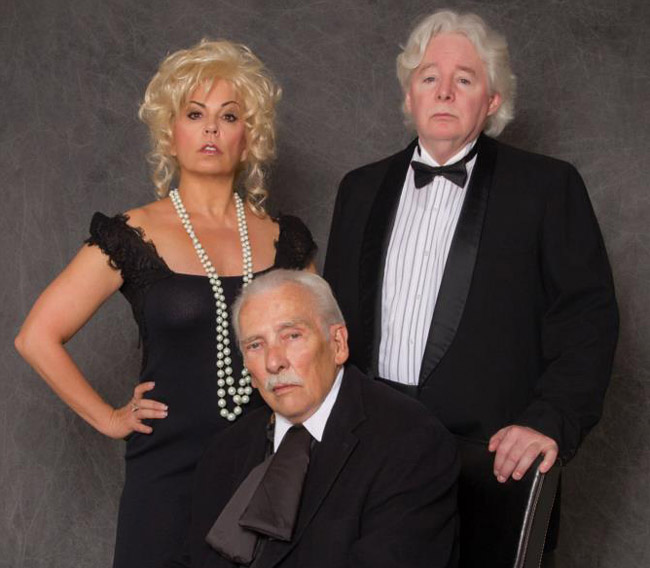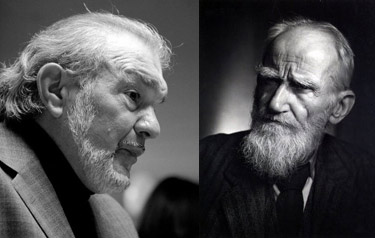
We have a rule inspired by George Bernard Shaw on FlaglerLive. Commenters are not allowed to correct anyone’s grammar or spelling, or refer to anyone’s poor vocabulary. That’s not because most of those who pass these judgments are themselves lousy writers, but because rating one’s language in a public forum is no different than making assumptions based on skin color or national origin. At heart, it’s a form of bigotry, an attempt to equate language with character, to use language as a measure of worth. It’s an old habit imported from England, where to this day a person’s accent is often equated with class, and why, as Shaw once said, “it is impossible for an Englishman to open his mouth without making some other Englishman despise him.” One of the great achievements of American English was to democratize the language: if language had been used as a tool of social control in the old world, the tables have turned in the New World, where language has been used as a tool of social change.
Language as class still has its cliques, as do all prejudices. It’s also a central theme of Shaw’s Pygmalion, the newest production of an old classic opening tonight (and running through Sunday) at John Sbordone’s City Repertory Theatre, at Hollingsworth Gallery.
It’s a story about an arrogant speech professor named Henry Higgins who makes a wager with a friend that he can take a working class flower girl named Eliza Doolittle and, transforming her accent and manners, pass her off as a Duchess and fool high society along the way. (A similar wager, with more racial than linguistic undertones, is the central conceit of “Trading Places,” the 1983 movie with Eddie Murphy and Dan Aykroyd.)
“The principal concept here is that language places us in society—how the use of language dictates where we go,” Sbordone says. “This was just how Shaw’s world was at the time he wrote Pygmalion. We determine the intelligence of an individual by his use of language. Back then, the cockney accent was at the bottom of the barrel.”
In the Greek myth, the sculptor Pygmalion carves a beautiful sculpture of a woman who he inevitably becomes so smitten with that he prays for her to come alive. There wouldn’t be a story if she didn’t in fact do that, which by now has become a widely used motif in popular culture. The parallel that gives Shaw’s story its name alludes to how Higgins metaphorically sculpts this flower girl into a Duchess. This makeover “leads her to find independence and allows her to fulfill her destiny,” says Sbordone. “Shaw believed in finding opportunity for everyone. His philosophy was what he called the Life Force—the spark of animus and creativity that drives individuals in society.”
This same life force affected the theatrical path of Sbordone himself, the self-proclaimed “volatile” former Flagler Playhouse artistic director who walked away from that gig in the midst of its most successful season. That event led him to opening City Repertory Theater at Hollingsworth, which is owned by J.J Graham, who has a similar damn-the-torpedoes demeanor. The Pygmalion myth is at work at Hollingsworth.
The play, Sbordone says, remains “relevant for anyone who isn’t getting anywhere because of the way they look or talk. Today, in America, whenever you hear a backwoods or Cajun accent, an immediate stereotype comes to mind. In our world, it’s less of a problem than it was back then in Victorian England, but it’s still a problem.”

The Irish-born Shaw, who lived from 1856 until 1953—“practically forever,” in Sbordone’s words—was controversial, prolific, witty, always polemical, and “the greatest master of literary sleight of hand the world has ever known,” as the critic Edmund Wilson described him. “Give him a platitude and in the twinkling of an eye he will transform it into a paradox.” H.L. Menken, who did not particularly like Shaw, put it less kindly: “On the one hand there is a mass of platitudes; on the other hand there is the air of a peep-show. On the one hand he rehearses facts so stale that even Methodist clergymen have probably heard of them; on the other hand he states them so scandalously that the pious get all of the thrills out of the business that would accompany a view of the rector in liquor in the pulpit.”
Shaw wrote some 60 plays, he was a music critic, essayist and short story writer, and all along was never afraid to parody the rigid class structure of British Victorian society. He was a Socialist and a key founder of the Fabian Society, whose goal was to advance the principles of democratic socialism. He also, ironically, went on to be a cofounder of the London School of Economics, now a factory of some of capitalism’s most powerful intellects. Pygmalion is probably his masterwork.
Written before World War I, Shaw’s exposé was scandalous, and meant to be: provocation was a Shaw reflex. The play opens in a rainy garden under a portico where a congregation of three upper class men shy away from Eliza because she’s a common flower girl. Eliza’s life is so stifled by her assigned place in society that even to be an adequate flower girl, she thinks she needs to be able to speak better. By chance Higgins, a language transcriber hears Eliza speak. He thinks he can work a little magic and makes a bet with a friend to that effect.
Sbordone’s production is based on a BBC radio rendition that cut a full hour from the original five-act play, reducing it to 90 minutes. City Repertory’s enactment is a stage reading so the full grandiosity of the original (and its innumerable sets), at least visually speaking, is lacking. That means there’s some magic required of Sbordone as well. He’s ready to deliver. The characters will don their period costumes. There’s very little staging, and the actors will read from scripts in-hand. Don’t be fooled: actors have a way with staged reading that, like musical transcriptions of great classics, can add fresh dimensions to a work. “We’re relying on language and great actors to bring the story to life. That’s the nature of a reading of any kind,” Sbordone says.
The cast includes Annie Gaybis, who’s worked with Kevin Costner, Burt Reynolds, Eddie Murphy, John Raitt and Placido Domingo, as Eliza; Robert Gill, a noted Shakespearean actor and creator of such one-man shows as Mark Twain and Henry Flagler, as Henry Higgins; Jack Wilbern as Pickering, and Paul Hunt who plays Alfred Doolittle, Eliza’s charming con-man father. He also acts as a narrator to guide audiences through different transitions between non-extant scene changes.
It’s a comedy. But Sbordone warns that, historically, many people who’ve seen the musical or movie are astonished by Shaw’s ending. “It’s not sentimental because it’s not a musical,” he says. “Henry’s, or rather Shaw’s, impetus was to win a bet to transform Eliza. Shaw wasn’t interested in the happy ending.” He wasn’t interested in sex, either, and it shows in the sexually ambiguous feel of his plays.
The Pygmalion myth is rich in precursors and descendants: Job as the victim of a wager between God and the Devil over Job’s piety, or, in a slightly less influential work, the 1999 teen drama, Cruel Intentions, where a callous step-brother and sister bet on the virginal conviction of a naïve girl who goes to their well-to-do private school. This latest production is coincidentally timed with the end of an electoral season where class and language played prominent, if usually unacknowledged, roles.





























JAMES says
Very interesting first paragraph, though I think the way a person speaks or write’s is a strong indicator of their education but it is most definitely is not an indicator of their character. Kudos to Flaglerlive.
Clint says
Pardon me , would you happen to have any Grey Poupon !
Rosine says
Bravo for “Pygmalion!”
John Sbordone says
Wonderfully researched article, but plase note that Diane Ellertsen is co-founder and the “life force ” of City Rep.